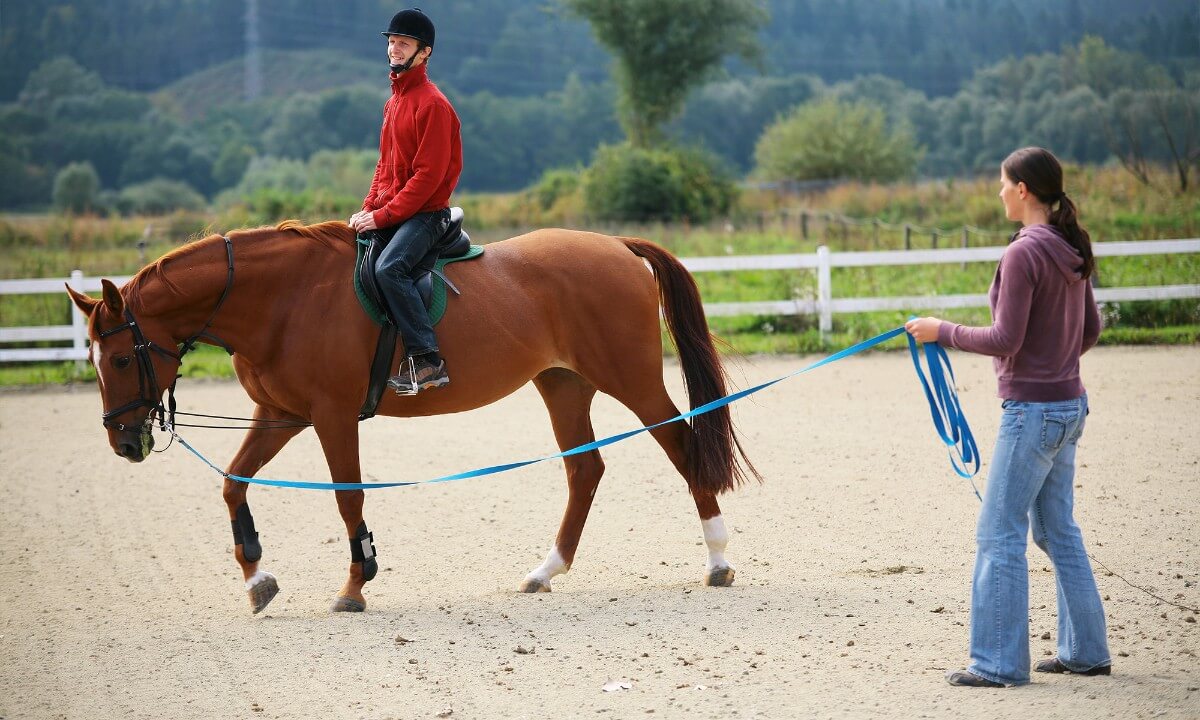
You’ll instruct riders of all skill levels, from beginners to competitive riders. You also teach individuals who have physical or learning difficulties.
You will be teaching a variety of riding and activities, including flat riding, show jumping, and dressage.
You must thoroughly analyse each student’s current abilities and talents. You must ensure that pupils have the basic skills required to mount and ride a horse safely – confidence is essential for both rider and animal.
You must create and execute a lesson plan for each class so that students may progress at their own pace and feel accomplished. In addition, you must keep track of each student’s progress.
Aside from teaching, you may train young horses to respond to the rider’s commands. You might also provide Assistants and working students with lectures or courses on feeding, first aid, and grooming.
Of course, you must ensure that the horses are fed, watered, and exercised regularly and that they are healthy and in excellent condition. Some teachers do these tasks in addition to cleaning stables and equipment. Others supervise grooms and trainees in this trade.
Dealing with administrative duties such as procuring supplies, processing accounts, and providing progress reports is another component of the job that you may need to catch up on.
Responsibilities
Throughout your apprenticeship, you may help:
- teach people who want to ride as a leisure activity
- help prepare for competitions like show jumping, eventing or dressage
- make sure health and safety rules are followed
- help horses and riders to warm up and cool down during training
- develop training programmes suited to individual riders
- give practical demonstrations
- help riders correct problems
- lead groups of riders on treks
- give feedback and keep records of rider development
- assess riders who are working towards qualifications.
Salary
In the United Kingdom,apprentice riding instructors wages are £14,000 and £25,000 for a fully licenced and experienced instructor. Pay rates will vary based on your qualifications and whether or not you are supplied with lodging and food.
Some riding instructors are self-employed. The quantity of business they attract determines their income.
Working hours
Normally, you’ll work 36 to 38 hours a week, working evenings, weekends and bank holidays depending on customer demands.
Working environment
You could work at a riding stable.
Your working environment may be outdoors in all weathers.
You may need to wear safety clothing and use safety equipment.
Qualifications
Qualifications you can achieve as an apprentice horse riding instructor include:
Level 2 Equine Groom – Entry requirements for this level include some GCSEs, usually including English and maths, or equivalent, for an intermediate apprenticeship.
This can take up to 18 months to complete. You’ll do on-the-job training and spend time with a college or training provider. Once you complete your apprenticeship, you could apply for jobs as a riding instructor’s assistant and take further coaching qualifications on the job.
Skills
On a horse riding instructor apprenticeship, you’ll learn:
- the ability to teach pupils how to do something
- leadership skills
- the ability to create the best conditions for learning or teaching new things
- patience and the ability to remain calm in stressful situations
- excellent verbal communication skills
- the ability to monitor your own performance and that of your colleagues
- the ability to work on your own
- customer service skills
- to be able to carry out basic tasks on a computer or hand-held device.
Career path and progression
If you have experience, you can supervise younger workers and train other riding instructors. You might form your own company and work as a freelancer for many centres.
Higher level certificates, such as a Level 4 Certificate in Horse Care and Management or a degree in Equine Business Management, may be pursued to start your riding school, pony trekking, or riding holiday centre.
You may advance to become a head or senior instructor, a competition judge, or a manager.
After gaining some experience, you might apply for the IGEQ Equestrian Passport, which would make it easier for you to obtain work abroad.
